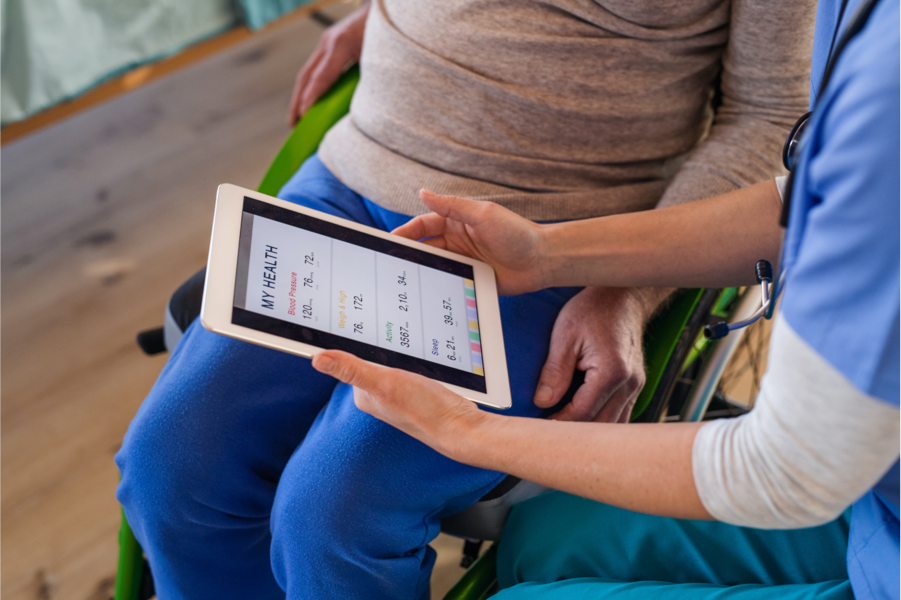
CLINICAL PRACTICE
How to Build Strong Relationships with Patients as a Traveling Nurse
-
 EveryNurse Staff
EveryNurse Staff
- Last Updated: 05/10/2023

As a traveling nurse, building strong relationships with your patients can be a challenging but rewarding experience. The nature of your work means that you’ll be meeting new people and working in new environments regularly, all while providing high-quality care for those who need it. In this article, we’ll explore some of the unique challenges that come with travel nursing and provide tips on how to build trust and connection with your patients.
Unique Challenges of Travel Nursing
Travel nursing can be exciting and fulfilling, but it also comes with some unique challenges. One of the primary challenges is adapting to new work environments with different protocols, procedures and patient populations. This can be overwhelming, especially if you’re new to travel nursing.
Additionally, there’s the challenge of balancing your personal and professional life while on the road. It can be difficult to maintain relationships with loved ones and find time for self-care and relaxation. Finally, travel nursing requires a certain amount of self-sufficiency and flexibility. You will often be working independently and must be comfortable with making decisions on your own.
Adapting to New Work Environments
One of the biggest challenges of travel nursing is adapting to new work environments. Every hospital or clinic has its own unique procedures and protocols, and it can take time to learn how things are done. However, it’s essential to establish a good working relationship with your colleagues and superiors right from the start.
Take the time to learn who’s who and introduce yourself to everyone you’ll be working with. Once you’ve familiarized yourself with your new workplace, you’ll feel more confident in your abilities and better able to provide high-quality care to your patients.
Building Trust with Colleagues and Patients
Trust is a crucial component of any nursing job, but it’s especially important when you’re a traveling nurse. Patients need to know that you’re there to help and that you have their best interests at heart. Colleagues need to trust that you’re competent and capable of providing excellent care. Building trust takes time and effort, but it’s essential to establish a connection with your patients as soon as possible. Make eye contact, ask open-ended questions, and listen actively. Your patients will appreciate your compassionate and caring approach, and they’ll be more likely to trust you as a result.
Building trust with colleagues can be just as important. Take the time to get to know your coworkers and their strengths and weaknesses. Offer to help out when needed and be willing to ask for help when you need it. By building strong relationships with your colleagues, you’ll be able to provide better care to your patients and feel more supported in your work.
Balancing Personal and Professional Life
Sometimes, it can be difficult to separate your personal and professional life when you’re a travel nurse. You may be working long hours in a new city and not have many opportunities to relax and unwind. However, it’s important to find time for yourself and maintain a healthy work-life balance. Take breaks when you need them, make time for exercise, and stay in touch with friends and family back home. Remember that taking care of yourself is just as important as taking care of your patients.
One way to maintain a healthy work-life balance is to take advantage of the unique opportunities that come with travel nursing. Explore your new city during your time off, try new foods, and immerse yourself in the local culture. By taking time to enjoy your surroundings, you’ll feel more refreshed and energized when you return to work.
Effective Communication Techniques for Travel Nurses
Active Listening and Empathy
Active listening and empathy are critical skills for any nurse, but they’re especially important for travel nurses. When you’re meeting new patients regularly, it’s important to listen actively and demonstrate empathy. This means paying close attention to what your patient is saying, reflecting on their feelings, and responding appropriately. Remember that your patients want to feel understood and cared for, so take the time to listen to them and connect on a personal level.
For example, if a patient expresses concerns about their treatment plan, take the time to listen to their concerns and address them. You could say something like, “It sounds like you’re feeling unsure about your treatment plan. Can you tell me more about your concerns?” This shows that you’re actively listening and that you care about their well-being.
Asking Open-Ended Questions
Asking open-ended questions can help you gather more information from your patients and show that you’re interested in their well-being. Instead of asking closed-ended questions that can be answered with a simple yes or no answer, try asking questions that require more thought and give your patients a chance to open up. This helps to establish a deeper connection with your patients and can provide valuable information that can inform your care decisions.
For example, if a patient is experiencing pain, you could ask them to describe the pain in detail. This can help you determine the cause of the pain and develop an appropriate treatment plan.
Utilizing Nonverbal Communication
Nonverbal communication, such as body language and facial expressions, can be just as important as verbal communication when it comes to building trust with your patients. Make sure that your body language is open and welcoming, and that you’re maintaining eye contact throughout your conversations. You want to show your patients that you’re fully engaged and invested in their care.
For example, if a patient is expressing concerns about their treatment plan, you could nod your head and maintain eye contact to show that you’re actively listening and taking their concerns seriously.
Overcoming Language and Cultural Barriers
As a travel nurse, you’ll be working with patients from diverse backgrounds and cultures. It’s essential to be sensitive to these cultural differences and be willing to adapt your communication style to meet your patient’s needs. If language is a barrier, consider working with an interpreter or using translation tools to help facilitate open communication. Take the time to learn about your patients’ cultural beliefs and customs and integrate this knowledge into your care decisions.
Establishing a Personal Connection with Patients
Sharing Personal Stories and Experiences
Sharing personal stories and experiences can help establish a personal connection with your patients and show them that you’re more than just a caretaker. Of course, you want to maintain professional boundaries and avoid oversharing, but sharing a personal detail or two can help build rapport and ease tension. Just be sure to keep the focus on your patient and their needs.
Showing Genuine Interest in Patients' Lives
Your patients are more than just their medical conditions. They’re people with unique experiences, interests, and challenges. Take the time to get to know your patients on a personal level. Ask about their families, hobbies, and interests. This shows that you care about them as individuals and not just as patients.
Respecting Patients' Privacy and Boundaries
While building a personal connection with your patients is crucial, it’s also important to respect their privacy and boundaries. Avoid prying into personal details that your patients are not comfortable sharing, and make sure that they’re comfortable with the level of information that you’re sharing about yourself. Remember that your patients have a right to privacy, and it’s your responsibility to make sure that their confidentiality is protected.
Providing Emotional Support and Encouragement
Finally, providing emotional support and encouragement to your patients is an essential part of building a strong relationship. Your patients may be going through a difficult time, and they need your support and encouragement to get through it. Be a source of positivity and encouragement for your patients, and make sure that they feel empowered and supported throughout their treatment.
Ensuring Continuity of Care for Patients
Collaborating with Other Healthcare Professionals
Keeping Accurate and Up-to-Date Patient Records
Keeping accurate and up-to-date patient records is critical for ensuring continuity of care. Make sure that you’re documenting all of your interactions with your patients, including any changes in their condition or treatment plan. This helps to ensure that other healthcare providers can pick up where you left off and continue providing the best possible care for your patients.
Facilitating Smooth Handovers and Transitions
Finally, it’s essential to facilitate smooth handovers and transitions when you’re working with a patient for a short time. Make sure that you’re communicating regularly with the healthcare providers who will be taking over your patients’ care when you leave. Provide detailed reports and information about your patients’ condition and treatment plan, and make sure that everyone is aware of any special needs or considerations.
Conclusion
Building strong relationships with your patients as a traveling nurse takes time and effort, but it’s essential to providing high-quality care. By understanding the unique challenges of travel nursing, communicating effectively, establishing personal connections, and ensuring continuity of care, you can build trust and provide excellent care for your patients, no matter where you are in the world.



















